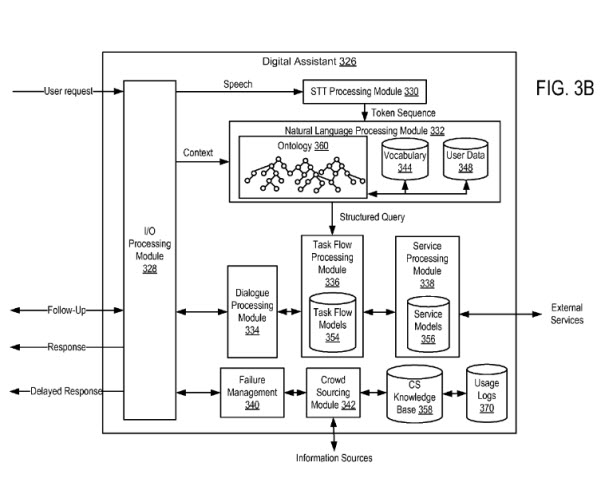You’ve probably seen TV commercials from Apple where celebrities ask their iPhones questions and have conversations with Siri on several topics. If you’ve looked at the original Siri patent filing, Intelligent Automated Assistant, you might be amazed at the kinds of things that it says Siri could be capable of.
The commercials and the patent filing probably overstate things a bit (OK, definitely overstate things when people try to do some of the same tasks that Samuel Jackson did in his commercial), and the Siri of today isn’t quite the all-knowing assistant that we see on TV or in the US Patent and Trademark Office filing. It’s poised as a personal assistant, capable of performing tasks and searches, but it doesn’t always know the answers to questions that it receives.
Related Content:
VentureBeat yesterday examined an Apple patent application (not yet granted) from Apple describing what might happen when Siri doesn’t know the answer to your question. It might hand off some queries that it can’t answer to human beings who might be specialists in different subjects. The post is titled Apple’s new Siri crowdsourcing patent sounds almost exactly like human-powered search engine ChaCha.
I was more excited by the “knowledge base” shown in the patent filing’s image below than the “crowdsourcing module” it shows.
The patent application is Crowd Sourcing Information to Fulfill User Requests. It’s written by some of the same people who worked on the original patent, including Thomas Robert Gruber and Adam John Cheyer, and Donald Pitschel on the new one, only.
So where will Siri get help when she doesn’t know the answers to questions? It probably depends upon the questions, but the claims section of the new patent filing tells us where they might come from:
These external information sources, for example, include expert information services, general information sources, and forums where answers to questions are provided in structured, semistructured, and unstructured forms by members of the public. Besides, crowdsourced information and answers can be stored, e.g., in a crowd-sourced knowledge base, in a manner that facilitates searching based on natural language queries or structured queries derived from subsequent user requests.
The VentureBeat article jumps to an assumption that a service like ChaCha might be the source of answers to questions that Siri can’t handle.
Google explored using a distributed information source through the acquisition of Aardvark to answer questions that might be better answered by people than by machines a couple of years back. While Google has discontinued Aardvark’s social search, the paper that may have inspired Google to acquire Aardvark does a great job of describing queries that tend to ask for reference librarian type answers, and queries that are searching for answers that might be better answered by the wisdom of a crowd, in The Anatomy of a Large Scale Social Search Engine (pdf).
Google may have decided that Google Plus might be a better tool to help people answer those social type searches.
The Description section of the new Apple patent application goes into more depth about these information sources:
[0126] In some embodiments, the CS information sources that the crowdsourcing module may query for information and answers include public forums. In a public forum, questions can be posted to a wide audience, and answers can be solicited and received from the general public who visit the public forum. Examples of public forums include online chat rooms, online message boards, discussion groups, and the like. In general, a large public forum can have sub-forums focused on different topics and subject matters. In some embodiments, the digital assistant can treat each sub-forum as a separate CS information source.
[0127] In general, public forums are suitable for collecting answers for queries that are difficult to categorize or comprehend for machines but may be easily handled by real people. For example, the digital assistant may fail to comprehend a question or answer such as “How to get rid of ants in my kitchen?” based on the domains and properties it has implemented so far, however, individual members of the public will easily understand the question and may have straight-forward answers right away.
[0128] In some embodiments, the CS information sources may include specialized sources providing more specialized and focused information, such as expert forums, technical support forums, fan-sites for the particular subject matter, and the like. The more specialized and focused CS information sources may be more suitable for queries that require specialized knowledge. For example, a user may ask, “Why can’t I print this?” after failing to print a webpage opened on her handheld device. The answer may require a diagnostic procedure that only specially-trained technical support staff or other technically savvy individuals can provide. The query regarding the error in printing a webpage from a user device may be more suited for a technical support expert forum than a general-purpose public forum or a product review expert forum, for example.
[0129] In some embodiments, the CS information sources include a group of self-identified contributors. Each contributor can be an individual or a group of individuals who have identified themselves as experts in particular fields and agreed to answer questions from the crowdsourcing module in the particular fields.
I’m not quite sure that I can envision Siri asking questions in Reddit, or StackOverflow, or even through ChaCha. I’m not sure if ChaCha would help Siri, as a competitor to their service. The VentureBeat article questions the possibility of acquiring ChaCha. I’m not sure that Google’s acquisition of Aardvark quite turned out the way that they wanted it to. I’m also not sure that the acquisition of ChaCha is the solution for Apple either. And, just because something is in a patent filing doesn’t mean that it’s on the horizon for Apple either, even if it did make sense from a business and technology perspective.
The things that didn’t show up in Siri that were described in that first patent filing are the kinds of things that could potentially be solved with a search engine that could handle complex queries, like what Google is attempting with their Hummingbird update.
This new patent filing continues to build upon that first patent filing while describing how the difficult questions to answer might be outsourced to a crowd-based solution.
I mentioned above near the patent screenshot that the knowledge base being shown excited me more than a crowdsourced solution to answering difficult queries. I’d love to see Apple go all-in on providing search results using a concept-based knowledge base and search engine.
Will they?
Maybe we should ask Siri?
Search News Straight To Your Inbox
*Required
Join thousands of marketers to get the best search news in under 5 minutes. Get resources, tips and more with The Splash newsletter:

